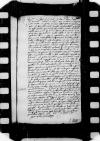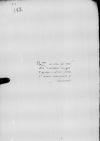Salutem non minorem, immo auctiorem in praesenti, quam on the margin⌈quamquam on the margin⌉ mea est, Dominationi Vestrae Reverendissimae a domino Deo opto et precor summopere, et hoc animo minime fucato aut simulate. Quod quidem eo teste scribo,
cf. Vulg. Ps (G) 43.22 nonne Deus requiret ista? ipse enim novit abscondita cordis. Quoniam propter te mortificamur tota die; aestimati sumus sicut oves occisionis. ⌊qui novit abscondita cordiscf. Vulg. Ps (G) 43.22 nonne Deus requiret ista? ipse enim novit abscondita cordis. Quoniam propter te mortificamur tota die; aestimati sumus sicut oves occisionis. ⌋. Si fallo, triplici graviore, quam Dominationis Vestrae Reverendissimae est tertiana, corripiat me aegritudine.
Tantum abest, ut ego de addenda afflictione Dominationi Vestrae Reverendissimae cogitarim, cum ad illam cum hoc puero cf. Ioannes DANTISCUS to Tiedemann GIESE Heilsberg (Lidzbark Warmiński), 1539-04-25, CIDTC IDL 2136⌊meascf. Ioannes DANTISCUS to Tiedemann GIESE Heilsberg (Lidzbark Warmiński), 1539-04-25, CIDTC IDL 2136⌋ dederam. Quas cum non satis considerate subscripsissem, neque demissiori, ut mos mihi est, loco, ratus me inde Dominationis Vestrae Reverendissimae amicum animum offensurum, appendicem excusationis addidi existimans eam acceptiorem futuram adducta imitatione, quam alio quovis modo, et hoc sane simpliciter et candide. Unde, ut Dominationem Vestram Reverendissimam ex ea opinione ob id concepta, quae mihi non potest esse non molesta et illi in hac valetudine incommoda, explicarem, non potui committere, quin hunc puerum evestigio remitterem impense orans, non secus rem atque ego amicissime sensi, nihil in eo astute aut data opera animo agitans, in mentem admittere velit curareque, ut nobis quamprimum incolumis restituatur.
cf. Cic. Off. 1.81 Quamquam hoc animi, illud etiam ingenii magni est, praecipere cogitatione futura et aliquanto ante constituere, quid accidere possit in utramque partem et quid agendum sit, cum quid evenerit, nec committere, ut aliquando dicendum sit “non putaram”.; V. Max. 7.2.2 Scipio vero Africanus turpe esse aiebat in re militari dicere “non putaram”, videlicet quia explorato et excusso consilio quae ferro aguntur administrari oportere arbitrabatur. Summa ratione: inemendabilis est enim error, qui violentiae Martis committitur.; Sen. Dial. 4.31.4 Turpissimam aiebat Fabius imperatori excusationem esse “non putaui”, ego turpissimam homini puto. Omnia puta, exspecta ⌊Dicere, ut ille inquit, non putaram, prudentis non estcf. Cic. Off. 1.81 Quamquam hoc animi, illud etiam ingenii magni est, praecipere cogitatione futura et aliquanto ante constituere, quid accidere possit in utramque partem et quid agendum sit, cum quid evenerit, nec committere, ut aliquando dicendum sit “non putaram”.; V. Max. 7.2.2 Scipio vero Africanus turpe esse aiebat in re militari dicere “non putaram”, videlicet quia explorato et excusso consilio quae ferro aguntur administrari oportere arbitrabatur. Summa ratione: inemendabilis est enim error, qui violentiae Martis committitur.; Sen. Dial. 4.31.4 Turpissimam aiebat Fabius imperatori excusationem esse “non putaui”, ego turpissimam homini puto. Omnia puta, exspecta ⌋. Ego certe, cum cf. Ioannes DANTISCUS to Tiedemann GIESE Heilsberg (Lidzbark Warmiński), 1539-04-25, CIDTC IDL 2136⌊appendicemcf. Ioannes DANTISCUS to Tiedemann GIESE Heilsberg (Lidzbark Warmiński), 1539-04-25, CIDTC IDL 2136⌋ scriberem, minime prudens fui, qui citius putassem caelum ruiturum, quam inde Dominationem Vestram Reverendissimam cf. Tiedemann GIESE to Ioannes DANTISCUS Löbau (Lubawa), 1539-04-26, CIDTC IDL 2140⌊laedi vel commovericf. Tiedemann GIESE to Ioannes DANTISCUS Löbau (Lubawa), 1539-04-26, CIDTC IDL 2140⌋. Ut igitur hoc negotium, quod praeter meam culpam suscepit, a se plane dimittat, quantum possum diligentius, oro et obtestor. Neque prius intimam recuperabo tranquillitatem, quam cognovero eam de me Dominationem Vestram Reverendissimam deposuisse suspicionem, quae mutuae nostrae amicitiae fraternoque amori minime convenit.
Ceterum, quod magnificus dominus Johann von Lusian (Jan Luzjański) (*before 1470 – †1551), brother of Fabian von Lusian (Luzjański), Bishop of Ermland (Warmia); 1514-1551 Voivode of Kulm (Chełmno); 1520-1525 Burgrave of Rössel (Reszel) (PSB 18, p. 166-167)⌊palatinus Culmensis on the margin⌈CulmensisCulmensis on the margin⌉Johann von Lusian (Jan Luzjański) (*before 1470 – †1551), brother of Fabian von Lusian (Luzjański), Bishop of Ermland (Warmia); 1514-1551 Voivode of Kulm (Chełmno); 1520-1525 Burgrave of Rössel (Reszel) (PSB 18, p. 166-167)⌋ mutaverit ratione Provincial Diet of Royal Prussia ⌊conventusProvincial Diet of Royal Prussia ⌋ sententiam, quam prius mordicus videbatur approbare, apud me mirum non est, cum sit totus cereus.
cf. Ioannes DANTISCUS to Gdańsk Town Council Heilsberg (Lidzbark Warmiński), 1539-04-26, CIDTC IDL 4359;
Ioannes DANTISCUS to Elbing Town Council Heilsberg (Lidzbark Warmiński), 1539-04-26, CIDTC IDL 6390⌊Scripsicf. Ioannes DANTISCUS to Gdańsk Town Council Heilsberg (Lidzbark Warmiński), 1539-04-26, CIDTC IDL 4359;
Ioannes DANTISCUS to Elbing Town Council Heilsberg (Lidzbark Warmiński), 1539-04-26, CIDTC IDL 6390⌋ cum Jan Gostyński royal courtier (AGAD, MK 58, p. 116v)⌊cubiculario regioJan Gostyński royal courtier (AGAD, MK 58, p. 116v)⌋, qui litteras conventus attulit[1], magnificis dominis Johann von Lusian (Jan Luzjański) (*before 1470 – †1551), brother of Fabian von Lusian (Luzjański), Bishop of Ermland (Warmia); 1514-1551 Voivode of Kulm (Chełmno); 1520-1525 Burgrave of Rössel (Reszel) (PSB 18, p. 166-167)
Georg von Baysen (Jerzy Bażyński) (*1469 – †1546), 1503-1512 Chamberlain of Marienburg (Malbork); 1512-1546 Voivode of Marienburg (PSB 1, p. 377)
Jerzy Konopacki Sr (Georg von Konopat) (*ca. 1480 – †1543), brother of Jan Konopacki, Bishop of Kulm (Chełmno); 1512-1516 Chamberlain of Pomerania; 1516-1518 Castellan of Gdańsk (Danzig); 1518-1543 Voivode of Pomerania (PSB 13, p. 547-548)⌊palatinisJohann von Lusian (Jan Luzjański) (*before 1470 – †1551), brother of Fabian von Lusian (Luzjański), Bishop of Ermland (Warmia); 1514-1551 Voivode of Kulm (Chełmno); 1520-1525 Burgrave of Rössel (Reszel) (PSB 18, p. 166-167)
Georg von Baysen (Jerzy Bażyński) (*1469 – †1546), 1503-1512 Chamberlain of Marienburg (Malbork); 1512-1546 Voivode of Marienburg (PSB 1, p. 377)
Jerzy Konopacki Sr (Georg von Konopat) (*ca. 1480 – †1543), brother of Jan Konopacki, Bishop of Kulm (Chełmno); 1512-1516 Chamberlain of Pomerania; 1516-1518 Castellan of Gdańsk (Danzig); 1518-1543 Voivode of Pomerania (PSB 13, p. 547-548)⌋ et Ludwig von Mortangen (Ludwik Mortęski) (†1539), 1512-1516 Castellan of Gdańsk (Danzig); 1516-1539 Castellan of Elbing (Elbląg) (SBPN 3, p. 256-257; PSB 22 Morsztyn Zbigniew - Mytkowicz, p. 9-11)
Achatius von Zehmen (Achacy Cema) (*ca. 1485 – †1565), 1517-1531 Chamberlain of Pomerania, 1531-1546 Castellan of Gdańsk (Danzig), 1545-1546 Voivode of Kulm (Chełmno), 1546-1565 Voivode of Marienburg (Malbork) (SBPN 1, p. 194-195; ORACKI 1984, p. 38-39; Urzędnicy 5/2, p. 198; PSB 4, p. 325-326)
Mikołaj Działyński (Nikolaus von Dzialin) (†1545), from 1507 royal courtier; 1510-1528 Chamberlain of Dobrzyń; 1528-1544 Castellan of Kulm (Chełmno); 1544-1545 Voivode of Pomerania; Starosta of Bratian, Strasburg in Preussen (Brodnica), and Dobrzyń (PSB 6, p. 92-94; Urzędnicy 5/2, p. 204)⌊castellanisLudwig von Mortangen (Ludwik Mortęski) (†1539), 1512-1516 Castellan of Gdańsk (Danzig); 1516-1539 Castellan of Elbing (Elbląg) (SBPN 3, p. 256-257; PSB 22 Morsztyn Zbigniew - Mytkowicz, p. 9-11)
Achatius von Zehmen (Achacy Cema) (*ca. 1485 – †1565), 1517-1531 Chamberlain of Pomerania, 1531-1546 Castellan of Gdańsk (Danzig), 1545-1546 Voivode of Kulm (Chełmno), 1546-1565 Voivode of Marienburg (Malbork) (SBPN 1, p. 194-195; ORACKI 1984, p. 38-39; Urzędnicy 5/2, p. 198; PSB 4, p. 325-326)
Mikołaj Działyński (Nikolaus von Dzialin) (†1545), from 1507 royal courtier; 1510-1528 Chamberlain of Dobrzyń; 1528-1544 Castellan of Kulm (Chełmno); 1544-1545 Voivode of Pomerania; Starosta of Bratian, Strasburg in Preussen (Brodnica), and Dobrzyń (PSB 6, p. 92-94; Urzędnicy 5/2, p. 204)⌋[2] atque etiam Gdańsk Town Council ⌊dominis GdanensibusGdańsk Town Council ⌋ et Elbing Town Council ⌊ElbingensibusElbing Town Council ⌋, ut si pestis adhuc Marienburg (Malbork), town and castle in northern Poland, Pomeranian Voivodeship, on the Nogat river, a branch of the Vistula at its delta, the capital of the Grand Masters of the Teutonic Order in Prussia (1309-1457), a voivodeship capital in Royal Prussia, which belonged to the Kingdom of Poland (1466-1772). Marienburg (taking turns with Graudenz (Grudziądz)) was the venue for the Provincial Diets of Royal Prussia, which were chaired by the bishop of Ermland (Warmia)⌊MarienburgumMarienburg (Malbork), town and castle in northern Poland, Pomeranian Voivodeship, on the Nogat river, a branch of the Vistula at its delta, the capital of the Grand Masters of the Teutonic Order in Prussia (1309-1457), a voivodeship capital in Royal Prussia, which belonged to the Kingdom of Poland (1466-1772). Marienburg (taking turns with Graudenz (Grudziądz)) was the venue for the Provincial Diets of Royal Prussia, which were chaired by the bishop of Ermland (Warmia)⌋ inficit, quod Sigismund I Jagiellon (Zygmunt I) (*1467 – †1548), King of Poland and Grand Duke of Lithuania (1506-1548); Duke of Głogów (Glogau) (1499-1506), Duke of Opava (1501-1506), Governor of Silesia (1504-1506); son of King Kazimierz IV Jagiellon and Elisabeth of Austria⌊regiae maiestatisSigismund I Jagiellon (Zygmunt I) (*1467 – †1548), King of Poland and Grand Duke of Lithuania (1506-1548); Duke of Głogów (Glogau) (1499-1506), Duke of Opava (1501-1506), Governor of Silesia (1504-1506); son of King Kazimierz IV Jagiellon and Elisabeth of Austria⌋ exspectemus ad cf. Ioannes DANTISCUS to Sigismund I Jagiellon Heilsberg (Lidzbark Warmiński), 1539-04-21, CIDTC IDL 6380, letter lost⌊meascf. Ioannes DANTISCUS to Sigismund I Jagiellon Heilsberg (Lidzbark Warmiński), 1539-04-21, CIDTC IDL 6380, letter lost⌋, quas ea de re per proprium messenger of Ioannes DANTISCUS ⌊nuntiummessenger of Ioannes DANTISCUS ⌋ dedi, responsum.
Quod reliquum est, omitto, ne taedio Dominationem Vestram Reverendissimam afficiam.
Quam convalere et pristinae sanitati restitui meque ab ea amari opto summopere.


 BCz, 245, p. 182
BCz, 245, p. 182